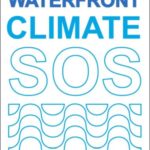
SOS CLIMATE WATERFRONT – H2020 MARIE CURIE ACTIONS
Linking Research and Innovation on Waterfront through Technology for Excellence of Resilience to face Climate Change
The shrink of bio-diversity, unprecedented climate swings and the raising costs of maintenance are symptoms of a planet struggling with Climate Change. To reestablish a healthy condition, cities seek to develop strategies of adaptation to make the built environment more resilient to face floods, droughts, high tides, tropical hurricanes and urban heat islands effect. Resilient urban environments are able to face the present challenges like sponges are able to absorb without degrade.
The concept of sponge implies porosity, urban waterscapes, sustainable strategy and cultural heritage. It requires a shift in the way cities have been designed in terms of dealing with Green infrastructure; planning with nature; regionalization, infrastructure; transportation; sustainable urban development and circular economy. Sponges take and give, they are passive and active and open a new realm of opportunities. Which urban strategies should be implemented? How solutions to adapt and mitigate will be able to enhance the resilience of cities?
Sustainable open solution on waterfront, facing climate change emerges from interdisciplinary and comparative cases to preserve the setting/world/locality. Recent research that proposes innovative resilience methodologies is also increasingly relevant.
CALL FOR PAPERS:
SOS Climate Waterfront invites original high-quality papers presenting current research, accommodating a broad spectrum of approaches ranging from speculative, informal investigations to conventional scientific research, including but not limited to the following topics:
- Sustainable strategy and Cultural heritage
Concepts and projects relating to water landscapes and cultural heritage focusing impacts on contemporary uses; Natural and anthropomorphic transformation during the time and in the present; Influence on public space impact of tourism and economic factors, learning from the past; Re-signification of elements of value, new functions or conservation of heritage buildings along the water; Adaptive heritage based on the integration between landscape and cultural heritage.
- Urban waterscapes
Transformation based on interdisciplinary approaches, new solutions that emerge from the exchange of expertise integrating various fields of knowledge geographic, social, environmental. The role of communities along waterfronts, new approaches and emerging strategies. Cross visions between cities, exchange of best practices identified in the present. New landscapes facing risks of floods and high tides; Blue infrastructures and waterfront as a part of cultural sites.
- Porosity
Transition of the built environment, from hard edge to soft edge. Emergent trend of new urban and waterscapes that negotiate with nature. Systems of resilience to adapt and mitigate effects of climate change, such as environmental planning addressing new patterns brought by extreme swings in the waterfront facing climate change. Future strategies to mitigate the heat urban island effect and enhance sponge effect. Shifts to face the approach of modernity towards the dialogue with the existing landscape.
Paper acceptance will be subject to a two-stage reviewing process, consisting of an initial abstract review and a later double-blind peer review of full-length manuscripts. The paper publication will be subject to review acceptance, compliance with submission deadlines and formatting guidelines.
Abstracts:
Abstracts will be subject to an initial review – length of 500 words plus key references.
Abstract submissions: info@sosclimatewaterfront.eu
Full Papers:
Full papers will be subject to a double-blind peer review of full-length manuscripts.
Length: 8 pages (ca. ~2500-3500 words).
Papers should be written following the Oxford style guide.
Publication of the paper will be subject to review acceptance, compliance with submission deadlines and formatting guidelines.
Accepted papers will be published on the SOS Climate Waterfront book, to be published in 2023.
Paper submissions: info@sosclimatewaterfront.eu
Paper Submission Dates:
Abstract Submission (500 words): 15th November 2022
Notification of Abstract Acceptance: 5th December 2022
Full Paper Submission: 27th January 2022
Notification of Full Paper Acceptance: 3th March 2023
SOS Climate Waterfront Editorial Board
Pedro Ressano Garcia Lusófona University of Humanities and Technologies
Maria Rita Pais Lusófona University of Humanities and Technologies
Claudia Mattogno La Sapienza University of Rome
Tullia Digiacomo La Sapienza University of Rome
Lucyna Nyka Gdansk University of Technology
Justyna Borucka Gdansk University of Technology
Alkmini Paka Aristotle University of Thessaloniki
Anastasia Tzaka Aristotle University of Thessaloniki
Katarina Larsen KTH Royal Institute of Technology in Stockholm
Lina Suleiman KTH Royal Institute of Technology in Stockholm
